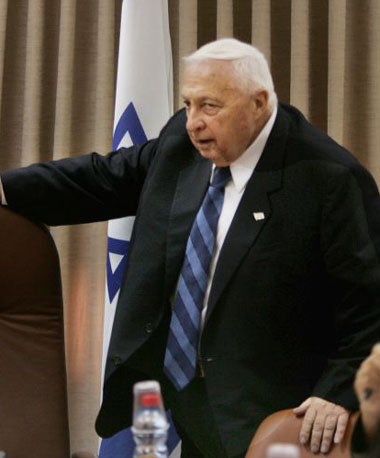Sharon takes centre ground in his great political gamble

Mr Sharon precipitated the most seismic shift in Israeli politics since he was the architect of Likud's foundation in 1973 by announcing last night he was launching a new "National Responsibility" breakaway party of the centre to fight elections in less than four months.
In a final break with his past as the standard-bearer of Israel's political right, Mr Sharon's departure from Likud dealt a massive blow to the party. But it also threw up a series of unpredictable post-election scenarios - including the of a coalition between himself and the new Labour leader Amir Peretz which could edge to ending conflict with the Palestinians.
Mr Sharon confirmed that the refusal of the hard-right Likud opponents of his pull-out from Gaza to accept his ministerial appointments last month had been the final factor in his decision to form a new "liberal" party. As the Knesset voted by a large majority to dissolve itself and precipitate an election in March, Mr Sharon declared: "The Likud in its present configuration cannot lead the nation to its goals." He added that "staying in the Likud would have meant wasting time with politics instead of working for the good of the nation. I prefer the good of the nation over comfort and ease."
By last night Mr Sharon had already secured the support of 14 Likud members in the Knesset - a third of the parliamentary party's members for his new breakaway. The figure is financially as well as psychologically important because it is the minimum required to qualify for state funding as a bona fide new party.
While the supporters include four senior ministers, led by his close ally the finance minister Ehud Olmert, they do not include Shaul Mofaz, the defence minister who declared last night that he would run for the leadership of Likud in Mr Sharon's place.
While the former prime minister and recent finance minister Benjamin Netanyahu is favourite to replace Mr Sharon at the head of a shrunken Likud, both Mr Mofaz and the foreign minister Sylvan Shalom could be alternatives. Both are Sephardic Jews, who may appeal to the working immigrant Jews from Muslim countries to whom the new Morocco-born Labour leader Amir Peretz is appealing.
They are also less likely to be associated with the benefit-cutting policies of Mr Netanyahu, which are likely to form a key part of the Labour leader's campaign. Tzipi Livni, the upwardly mobile female minister who heads the Justice Department, Avraham Hirschon and Gideon Ezra were the other ministers to join Mr Sharon last night.
While new breakaway parties have a poor record in Israeli politics - such as the flopping of David Ben-Gurion's Rafi party in 1965 - strategists pointed out that Mr Sharon was the first to have led one as an incumbent prime minister, in control of the government agenda until the election, and with personal approval ratings of between 60 and 65 per cent.
One strategist said the formation of the party was a logical step which took account of Israeli public opinion which, unlike Mr Sharon's right-wing tormentors, mainly supported the withdrawal of settlers and troops from Gaza in August. "Israeli opinion has changed just as Ariel Sharon's has and this party will be in tune with that."
Among figures outside mainstream party politics that have been canvassed to join the new party are Avi Dichter, the past head of Shin Bet, Israel's domestic intelligence agency and Professor Avi Braverman, the President of the Ben Gurion University of the Negev. Despite earlier speculation, Shimon Peres, the veteran Labour leader ousted by Mr Peretz, will not join Mr Sharon's new party and Mr Sharon indicated at his news conference last night that his former coalition deputy would be leaving mainstream politics.
The decision, like the success of Mr Peretz in winning the Labour leadership little more than a week earlier, has shifted the tectonic plates of Israeli politics and left the question of who will emerge as the leader of the biggest single party after the election almost impossible to predict.
Mr Sharon insisted last night that he was not planning further unilateral disengagements from the West Bank and was sticking by the internationally agreed "road map" which he has always insisted can only be activated if the Palestinian leadership disables militant factions.
But the political analyst Yaron Ezrahi said he believed Mr Sharon would do well in the election and that his success might presage a return to the peace process. He said Mr Sharon had recently ("and only recently") shown himself to be a statesman in the mould of Ben Gurion and the late Yitshak Rabin.
Professor Ezrahi added yesterday: "Israelis have not often seen political leaders who are able and willing to take very big political risks to pursue policies which they regard as being in the vital interests of Israel.The era of unilateralism is over because [Mr Sharon] will no longer be leading a party of 40 Knesset members." Current polls show Mr Sharon and Mr Peretz both gaining around 28 seats.
But Ahmed Khalid, a Palestinian analyst and former negotiator who is close to Mahmoud Abbas, the Palestinian President, said: "The better Sharon does in the election, the more we are likely to see unilateral moves, and the more Peretz does we may see some form of negotiations." But he warned that these might still lead to an "interim solution with provisional borders" which would fall short of Palestinian aspirations.
Join our commenting forum
Join thought-provoking conversations, follow other Independent readers and see their replies
Comments